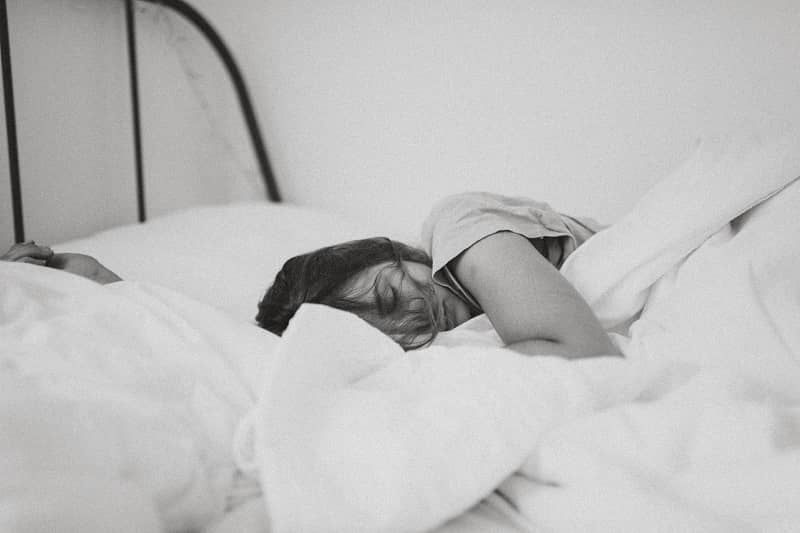


26 Apr Study Links Poor Sleep Habits to a Higher Risk of Dementia
Sleep and dementia are interrelated, a new study reveals. Sleeping less than 6 hours daily raises the risk of dementia by 30%.
Key Findings
- Poor sleeping habits can have a severe impact on your overall health.
- The study finds poor sleeping habits to be a major reason behind cases of dementia.
- Sleeping less than 6 hours daily can increase the risk of dementia by almost 30%.
It’s again one of those nights, you are yawning continuously.
Still, you go for the next episode on Netflix. Well, this is the new lifestyle of the millennia and a major reason behind the increasing health crisis.
A recent study suggests a continuous poor sleeping habit can increase the risk of dementia by 30%. The risk is severe in the case of older folks.
Sleep isn’t just about rest. It is the time when our entire body concentrates on healing the affected body functions.
When you break this cycle, adverse effects can be seen on different bodily functions. This includes physical activity as well as cognitive processes.
Let us fill you in on the details of the entire study…
Sleep and Dementia: The Study
Sleeping about six hours or less is an assurance of future failure of the brain functions. A new study published in Nature Communications journal has come up with some strong points.
Moreover, short sleep durations among people aged 50, 60, and 70 have further shocking findings.
They have a 30% greater risk of dementia.
The numbers are independent of cardiometabolic, behavioral, sociodemographic, and mental health factors.
The reason for these findings?
Proper sleep is highly necessary for normal brain functions. Not only does it get you sufficient rest but also clears off toxin protein build-up responsible for dementia.
However, the study by Nature trying to establish a relationship between dementia patients and sleep isn’t based on cause and effects.
The study in Nature shows the association of sleep duration in middle and old age with the occurrence of dementia.
Sleep dysregulation is a common yet unverified feature of dementia.
However, it is unclear and doubtful if sleep duration prior to old age is related to dementia or not.
It is still obvious that a little attention to your sleep habits will do you good. Obviously, it might also reduce the risk of dementia at night as well.
You can fight dementia, and sleeping a lot can help. The important thing is to understand what a good night’s sleep is.
What Is Considered a Good Night’s Sleep?


A good night’s sleep isn’t just about how many hours you were in bed. Quality matters equally.
So, take your sleep hours seriously.
A common misconception among youngsters is sleeping hours only apply to the oldies. However, experts completely decline the widespread myth.
Adequate sleep of 7 to 8 hours is necessary for everyone, even for all the night owls who find themselves more productive during the wee hours.
Whether you are 18 or 80, taking your sleep habits seriously can prevent lots of problems in the future.
In fact, it is more crucial for people in their early 20’s.
Initiating a bad sleeping routine at this phase leads to a long-term bad impact on your overall health.
If you are thinking of compensating nighttime sleep deprivation with daytime naps, you are WRONG!
Experts stress consecutive sleeping. The stages of sleep are crucial for good overall health.
So, a continuous sleeping period is necessary.
If you sleep for 7 or 8 hours, still wake up groggy, there’s a problem.
A night of good sleep is when you wake up feeling refreshed and active.
On the contrary, poor sleep has a bad impact on your health. It isn’t just about dementia sleep issues but more.
The Effects of Poor Sleep Habits



A bad sleeping habit isn’t just linked to sleep apnea and vascular dementia.
Findings reveal further serious complications arising because of it.
Poor sleep can be a major instigator for multiple problems in the entire body.
The Physical problem includes:
- Weight management issue
- Headache
- Diabetes
- Thyroid dysfunction due to hormone dysregulation
In the deeper stages of sleep, our hormone function resets and heals.
When you sleep less, the healing process is incomplete. Obviously, this applies to different health issues.
On the contrary, the cognitive problem arising due to poor sleep include:
- Anxiety
- Depression
- Poor Memory
- Degenerative Diseases Like Alzheimer’s
- Dementia
The issues are more prevalent with patients having an underlying sleep disorder.
According to some experts, the REM phase of sleep maintains our nervous system and memories.
Waking up early skips REM stage leading to sleep disorder and issues. Another potential reason why lack of sleep and dementia are co-related!
Still, following a few basic sleep hygiene can help prevent sleep apnea dementia symptoms.
A Sleep Hygiene Checklist Can Help Reverse The Effects
Small efforts can help reverse the long-term effects of poor sleep.
However, it requires dedication and persistent efforts to improve health.
Let’s start with the key measures!
[vc_accordion style=’accordion’] [vc_accordion_tab title=’#1. Exterior Environment and a Bit Of Physical Activity Can Help’ icon=” icon_color=”]Fresh air and workouts have an incredible impact on your overall health.
That is why people say to perform exercises outside in the morning.
Moreover, the morning Vitamin D storehouse helps regulate circadian rhythms while keeping your sleep consistent.
[/vc_accordion_tab] [vc_accordion_tab title=’#2. A Bedtime Routine Is Must’ icon=” icon_color=”]Going to bed at the same time every day has a big role!
It brings consistency to your sleeping pattern and leads to quality sleep.
Actually, your body feeds in the data and saves it like a computer in your body clock.
So, when it gets past your bedtime, you begin feeling drowsy.
[/vc_accordion_tab] [vc_accordion_tab title=’#3. Prepare Your Room for Better Sleep’ icon=” icon_color=”]Maintain your room temperature accordingly.
Also, try to keep the least number of gadgets and electronics in your bedroom as they impact your sleep time and quality greatly.
Most importantly, check if your pillows are soft enough.
A comfortable bed and head support further aids sleep quality and quantity.
[/vc_accordion_tab] [vc_accordion_tab title=’#4. No Insta or Netflix Before You Hit The Bed’ icon=” icon_color=”]Make sure you don’t put much time in scrolling the social media platforms or playing games at night.
This also includes binging movies and web series for hours on Netflix. These cost your sleep, which further consumes your health.
The light flashing on your face activates your brain.
Hence, sleeping afterward becomes a complicated job.
[/vc_accordion_tab] [vc_accordion_tab title=’#5. Zilch Daytime Naps’ icon=” icon_color=”]Some people tend to take naps quite a few times a day.
The main reason is to compensate for the lack of quality nighttime sleep.
Meanwhile, occasional naps are great for occasional refreshing.
However, in the long run, it declines the restorative sleep hours, which is crucial for overall health.
[/vc_accordion_tab] [/vc_accordion]
Following these sleep hygiene tricks can help very much in diminishing poor sleep habits and problems related to it. Start from today to see the difference.
Sleep and Dementia: The Outlook
If we follow up the study closely, it strongly strengthens the fact that poor sleep can result in dementia.
The study published in Nature sheds light on various aspects of the relationship between sleep and dementia risk.
- First and foremost, poor sleeping habits decline overall health.
- It impacts physical and mental health.
- The impact differs in different age groups.
- The study shows a strong correlation between poor sleeping habits and dementia.
- Sleep duration of six hours or less at age 50 and 60 increases the risk of dementia by 30%.
Besides the not-so-good relationship between Sleep and dementia, there are various other negative effects of undermined sleep duration.
Not only it has cognitive effects but it also interrupts the body weight management system.
In other words, a negative influence on your sleeping habit leads to extremely adverse effects on your overall health.
Nonetheless, following basic sleep hygiene shows impeccable improvement.
It can slightly reverse the issue along with the doctor’s prescriptions and medications if you do start to develop any symptoms of dementia.
SOURCE:
The Published Study: Association of sleep duration in middle and old age with incidence of dementia: Sabia, S., Fayosse, A., Dumurgier, J. et al., April 2021.
Sleep disturbances increase the risk of dementia: A systematic review and meta-analysis: Shi L, Chen SJ, Ma MY, Bao YP, Han Y, Wang YM, Shi J, Vitiello MV, Lu L. , 2018.



No Comments